Matthew Abraham: A basic summer holiday is being priced out of the reach of many South Australian families
Many of the tantalising ads of holidays at home portray adventures that are simply too expensive for many working class or unemployed people.

Opinion
Don't miss out on the headlines from Opinion. Followed categories will be added to My News.
The big black Wolseley 6/80 was stacked to the gunnels for the Great Wallaroo Beach Holiday of 1964. Or was it 1965?
The exact year is lost in the sands of Yorkes but the other details of the trip are etched in my memory, for reasons that shall become obvious a little later on.
The Abraham family didn't do beach holidays. We didn't do many holidays, full stop, because mum and dad were skint.
So the Wallaroo holiday was a big deal, with all four children squirming on the rear leather bench seat – no seat belts – and the boot groaning with make-do camping gear.
We didn't have a caravan like the rich kids, so dad parked on a patch of red sand amid a stand of she-oaks in the caravan park, strung a canvas between the car doors on one side and the tree trunks, and we were ready to rock and roll.
Mum cooked on an electric frypan, with an extension cord running through the trees to a power pole.
Before this starts to sound like The Four Yorkeshiremen sketch – “oh, we used to dream of livin' in a corridor” – my brothers Eugene and Frank, sister Carmel and I thought it was the holiday of a lifetime. Looking back now, it was a seriously povvo affair.
In this bright new age, the cheap and cheerful family holiday is not drowning, just waving goodbye.
Increasingly, a basic summer holiday in our home state is being priced out of the reach of many South Australian families. Local councils once prided themselves on running affordable caravan parks and camping grounds, but these are vanishing in the sand.
Many of the tantalising images screened on the State Government's holiday-at-home COVID advertisements portray adventures that are simply too expensive for many working class or unemployed people.
It's no surprise the second round of the Marshall Government's laudable free travel vouchers again crashed the government's servers, as people desperately scrambled for $100 off a holiday.
Yet $100 would barely buy a round of pies, cream buns and milkshakes for a large family at a country bakery.
Want to create your own no-frills adventure, pitching a tent in the bush? Good luck with that because it'll almost certainly be illegal.
A raft of state and local government regulations, by-laws and penalties herd people like sheep into increasingly crowded and overpriced tourist towns.
We've spent the last couple of weeks around Normanville, home to the planet's most beautiful beaches. The beaches of Normanville and Carrickalinga are whiter than white, and I'm not just talking about the sand.

Cultural diversity doesn't seem to be a happening thing on the Fleurieu at this time of the year. The only people of colour you're likely to see in any numbers on its busy streets or beaches are white people with fluoro zinc cream on their faces – it's the Fluoro Peninsula.
I'm one of the white, sunblocked masses. This is no crime, just an observation. But it's worth asking why this may be so. Is even a no-frills beach holiday now simply wishful thinking for new immigrant or refugee families or Indigenous Australians?
A week ago Yankalilla Council unveiled plans for an $11m upgrade of the Normanville foreshore, including more parking and a bigger lawn area. I'd put this in the “if it ain't broke don't fix it” category because Normy's foreshore lawns are perfectly fine.
The majority of the cash – the council only has half of what it needs but hopes the tooth fairy will find the missing $6m – is to be spent “upgrading” the council's caravan park.
As The Advertiser reported, it plans to build 23 “up market” new cabins, replacing “some campsites and existing, older-style cabins, generating more income and drawing extra holiday-makers”.
In other words, it wants to make it more expensive to use its caravan park. Why not spend the money creating affordable, well-serviced, safe camping grounds with cooking facilities, toilets and showers for low-income tourists? That'd be radical.
Oh, yes, back to Wallaroo, circa 1964. One night we three boys, all under 12, woke up and thought it'd be a good idea to explore the town, attracted by the lights of the local bakery. It was probably 3am but our journey was lit by an enormous full moon.
Unfortunately, mum and dad had woken to find us gone. Dad ran down to the jetty, where a ship was loading grain, driven half-mad by visions of three stowaway sons buried under a pile of barley. We bumped into him on the way back and greeted him with a cheery "Hi, Dad". A poor choice of words.
The Great Wallaroo Beach Holiday was over. At daybreak, the Wolseley accelerated home, the longest, quietest drive of my life.




